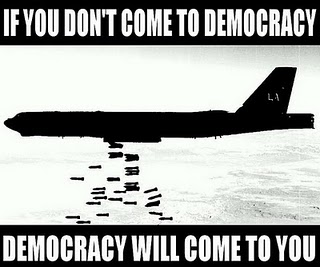
The Muslim world is dominated by the West, overtly via military and economic means, but also covertly through the manipulation of language. Control a person’s language and you limit his thinking and control his ability to articulate what he desires.
Take a simple word such as ‘Democracy’. By associating it in the minds of the Muslims with freedom from tyranny and oppression, they have made it a common call across the Muslim world. You hear it chanted on the streets from Cairo to Tripoli, and these chants carried by the global media to every corner of the planet, clear undeniable evidence of the desire for democratic reform in the Muslim world?
But where is the danger in this? Surely a word can mean many things to many people, and what is important is what the intended meaning by the one who uses it? If Muslims choose to label their liberation as ‘Democracy’, what harm could it bring?
Most words are indeed harmless; they just convey a simple meaning or description. But some words carry a depth that cannot be conveyed by a few lines in a dictionary. They carry the weight of history behind them, and they carry a meaning which is intertwined with a belief about life itself.
‘Democracy’ is such a word.
Far from being a simple collection of letters, it is a word that was forged through centuries of bloodshed across Europe. It is a word which is associated with freedom from the oppression by tyrannical Monarchies, who through a twisted collaboration between themselves and the Christian clergy had maintained dominance over the people by claiming themselves and their bloodlines ‘chosen’ by God. So the eventual backlash against this situation was not just about removing dictatorships, but removing religious dictatorships. This struggle is an intrinsic part of the collective psyche of the western world; when they talk about the right of people to govern themselves, they also mean the prevention of religious interference in ruling – whether this is explicitly stated or not.
So in essence the word is actually a part of a culture. It comes with not just a linguistic meaning but also a history and a set of values, all of which are inextricably linked to this single word ‘Democracy’. When understood in its true context, it becomes clear why using such a word is dangerous. Muslims marching on the streets in the middle-east understand the linguistic meaning, which they see as something which fits with their own demands; the right to elect your own ruler, the right to have an independent judiciary, the right to hold you rulers to account etc. But they do not appreciate the history behind the word or the values that are part and parcel of it, and as such are unaware that they are sending out message to the world which they did not intend.
Imagine a human-rights charity who decided that a swastika would be a suitable logo for their organisation, being ignorant of the symbol’s association with the Nazis. So, being ignorant of the history and values that come with the symbol they proudly display it on their leaflets and posters. Would this convey the message they wanted?
Similarly while the Muslims believe they are simply calling for their rights by adopting the term ‘Democracy’, the world views such a call for the removal of Islam from governing and for the implementation of secular liberal values.
It is through this confusion over the use of language that particular words such as ‘Democracy’ can be used as weapons against the Muslims. The word is pumped endlessly through the media and via secular political groups, until it becomes a slogan for the struggle and adopted by the masses, unaware of what it means.
What an unforgivable crime it would be if the sincere efforts and sacrifices of the Ummah to rid themselves of the chains of colonialism and dictatorship merely resulted in them replacing one set of chains with another, ones which they hang around their own necks?
But the crime would not be theirs. They would have done their part in this global struggle, the failure would be ours. For every part of this Ummah has a role to play; for some this is a physical struggle, putting their lives on the line. For others this is an intellectual struggle, to see through the words spoken by politicians and to expose the real agenda.
So let us take a stand against the imposition of a foreign culture in the minds of our people through these words. Let us draw a clear line between Islam and Kufr, as clear as the difference between praying in a church or praying in a mosque. Democracy is part of a culture that is foreign to Islam. Democracy is a Western construct and therefore foreign to the Muslim world and Democracy is much more than elections. We have our own unique history and culture, and our own system which is distinct from that of the west: the Khilafah. It encompasses the right to elect the ruler, to hold him to account and remove him if he contradicts Islam. We have a judiciary to uphold the rule of law and the many other state institutions that the Muslim world demands, but it does not do so at the expense of the Islamic values that are demanded just as strongly.
أَفَتَتَّخِذُونَهُ وَذُرِّيَّتَهُ أَوْلِيَاءَ مِنْ دُونِي وَهُمْ لَكُمْ عَدُوٌّ ۚ بِئْسَ لِلظَّالِمِينَ بَدَلًا
“Do you take him and his offspring as protectors apart from Me when they are your enemy? How evil is the exchange the wrongdoers make!” (Kahf, 18:50)
